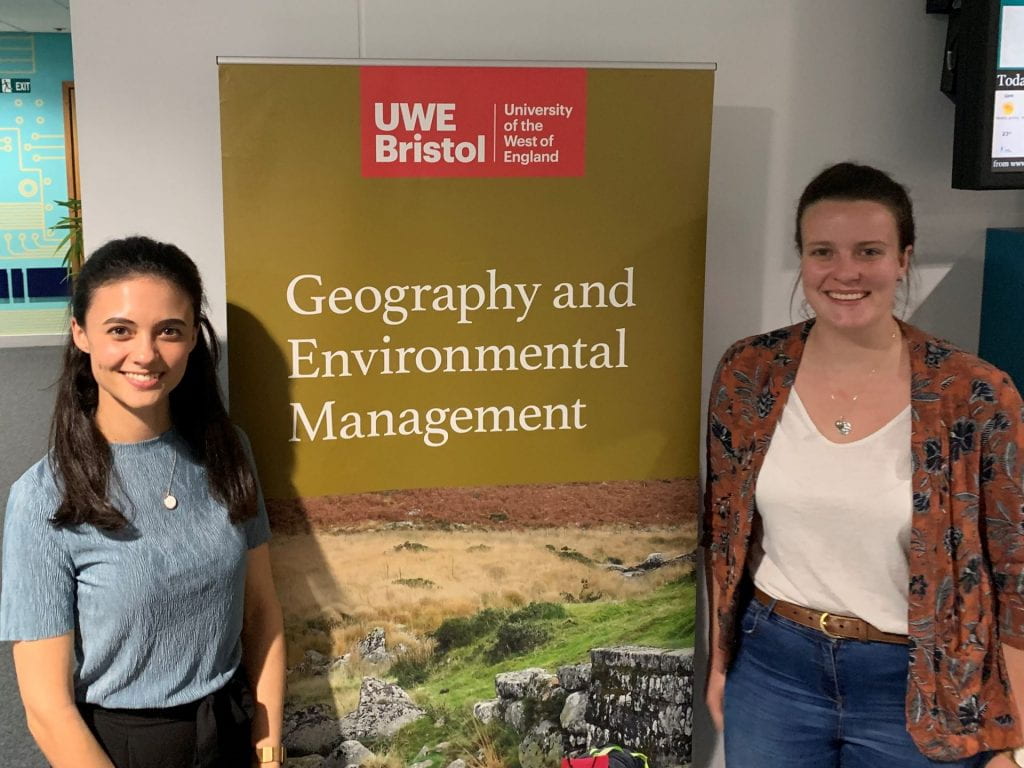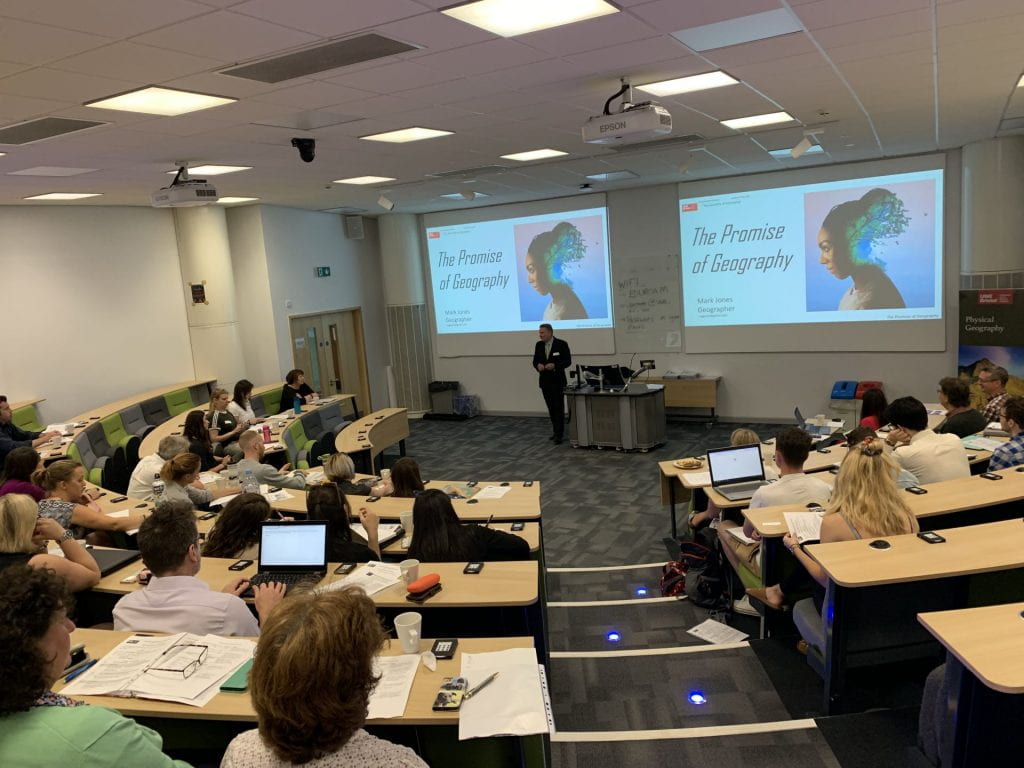Reflections on GA/UWE Annual Geography Conference 2019
‘The Benefits of Belonging’ Thursday 27th June 2019
by Natalie Ambrose and Hannah Dunton (pictured below), PGCE students at UWE 2018-9.
This year’s Bristol Geographical Association Annual Conference was organised and run by Michelle Graffagnino and Harry West, academics at UWE Bristol. Past, present and future geographers, mentors, teachers and academics with a shared passion for teaching geography gathered for the conference, which included the sharing of good practice, subject updates and personal reflections.

Keynote
The Promise of Geography was explored by Mark Jones in his keynote address. He described how the way we teach geography in schools and universities has shifted from a largely regional approach to an issues-based approach and how the national curriculum has changed the role of the teacher as curriculum maker. He asks us to reflect on the blind application of generic cognitive load theories to the teaching of geography and whether this truly allows us to deliver all that Geography promises to be as a discipline to stimulate an interest in our world. He concludes that in order to deliver Geography as it promises to be, as teachers we must consider what pupils are learning about, what they are learning through and what they are learning for. Mark ends by asking how teaching about rivers would look different if it were being taught for an exam or some other purpose versus if it were being taught for rivers. These last few impactful words of his address have influenced our own perceptions of our role as new geography teachers (M Jones – Keynote – The Promise Of Geography_reduced)

Following the keynote, there were a variety of lectures delivered by specialists in their field. These subject knowledge updates addressed current and future challenges and dilemmas in the teaching of geography and explored responses. The value of a face-to-face conference of this kind is truly evident where classroom teachers are given the opportunity to explore such specific subject knowledge matters with specialist academics and are encouraged to ask questions and share their own experiences of the subject.
Subject specialism talks
Andrew Tallon discussed ‘Regeneration Issues in Bristol’ and how general approaches to urban regeneration have changed since the 1960s. In particular, he highlights that urban regeneration requires some degree of direction from the state, which has been in short supply since 2010 in favour of private contractual agreements. Comparing Bristol to other early manufacturing cities, particularly those in the North, he points to manufacturing diversity as the reason why Bristol escaped the steep economic decline felt in other regions of the UK. Since then, Bristol’s growth has stemmed from financial and tech services as well as cultural services and industries. Tallon questions the future for cities in light of the popularity of suburbanising retail and leisure services and the increasing climate of fear as atrocities of all kinds in cities around the world are regularly publicised. (A Tallon – Regeneration Issues in Bristol_reduced)
Next, Aida Abzhaparova provided an in-depth update on the place of Global Governance within Geography. This included an exploration of the Post-1945 landscape, a discussion about what Global Governance is (and is not) and the challenges and pressures of Global Governance. Abzhaparova suggests a number of topics which help to take the subject from the abstract to the real world for today’s pupils, including exploration of issues such as refugees and migrants. She highlights some of the key points from her lecture through the case study of global migration flow, illustrating the challenges of often incoherent and fragmented global agreements. This was an important contextualisation of Geography’s place within wider social disciplines and enabled attendees to consider the influence of global cooperation on Geography as a subject. (A Abzhaparova – Global Governance_reduced)
Nevil Wyndham Quinn warned of an often oversimplified model of physical geography and how to avoid teaching this misconception in the classroom. He explored a number of diagrams of the water cycle which can be found online and highlighted the lack of inclusion of human effects on this cycle, including how it is somewhat overlooked in exam specifications. He followed this by sharing an exciting new project which he is currently working on with Michael Horswell, called ‘HydroBites’. This project will provide resources for schools which enable pupils to directly compare river flow and hydrology in different catchments in order to isolate specific factors which cause flooding. Such a resource is likely to have great value in enabling pupils to explore the real life application of the water cycle and river flooding and management in the classroom. (N Quinn & M Horswell – The Water Cycle and HydroBites_reduced)
Finally, Harry West delivered a practical ArcGIS Online and Survey123 session. He began by highlighting that the number of active ArcGIS online accounts in UK schools has grown to almost 100,000. It was stressed that the place of GIS in KS3, KS4 and KS5 is growing and therefore the importance of our ability as teachers to navigate the ArcGIS online platform has never been greater. The hands-on approach allowed for people of all abilities to get the most out of the session. (H West – ArcGIS Online and Survey123_reduced)
Support from Geography community
As PGCE students, the conference was an illustration of the support offered by and the wide ranging expertise of the Geography community in Bristol. To see our own mentors and tutors from across Bristol come together to role model the importance of Geography specialist CPD was a fitting way to end our teacher education. To feel integrated into such a community enables us to begin our teaching career with a true understanding of the benefits of belonging.
